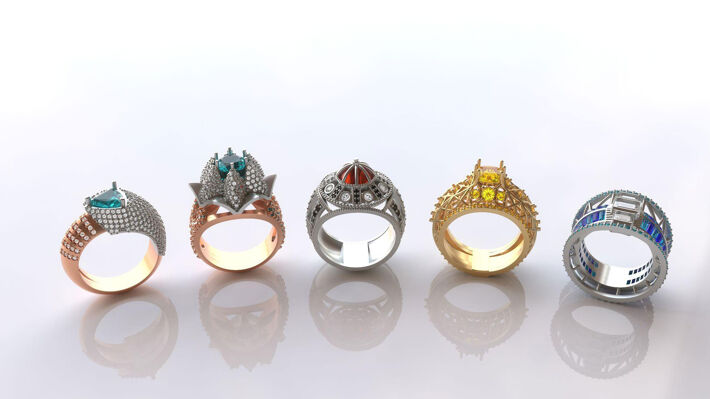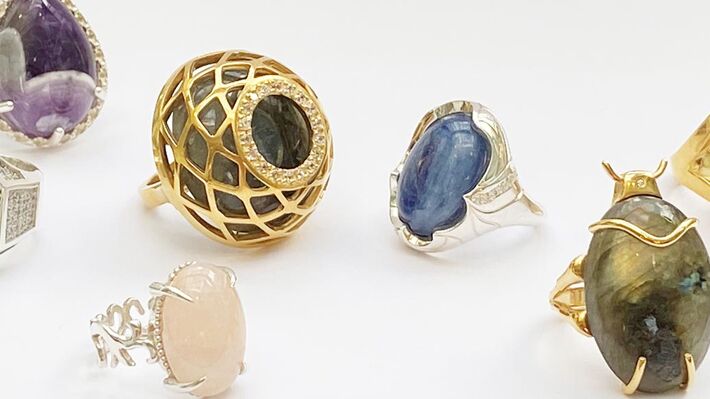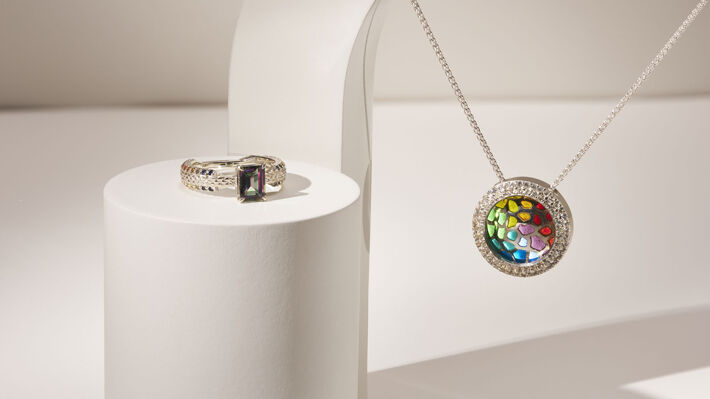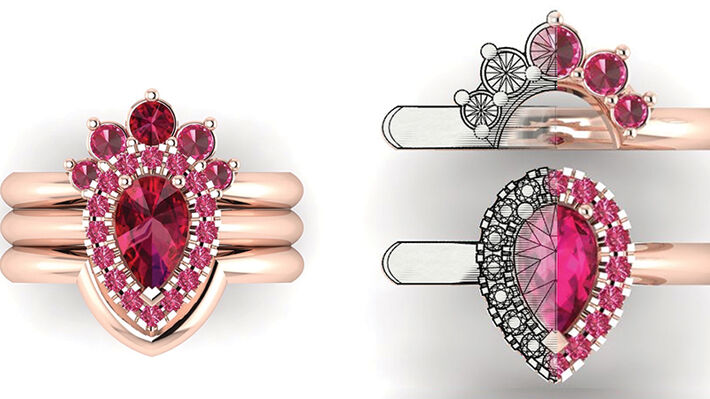Jewellery and Silversmithing - Design for Industry (Level 6 | Top-up) - BA (Hons)
Currently viewing course to start in 2026/27 Entry.
If you want to be a designer within the contemporary jewellery industry, our Jewellery and Silversmithing – Design for Industry degree course will help you succeed. Focusing on new technology but building on existing traditional skills, you’ll receive the support, facilities and expertise to enhance your jewellery design potential....
- Level Undergraduate
- Study mode Full Time
- Award BA (Hons)
- Start date September 2026
- Fees View course fees
- Subject
- Location School of Jewellery
This course is:
Open to International Students
Overview
If you want to be a designer within the contemporary jewellery industry, our Jewellery and Silversmithing – Design for Industry degree course will help you succeed.
Focusing on new technology but building on existing traditional skills, you’ll receive the support, facilities and expertise to enhance your jewellery design potential.
Our graduates are highly successful and go on to work in design and production roles for local and international businesses, as well as setting up their own successful companies.
What's covered in this course?
This leading design course is a one-year top-up, shaping contemporary designers for the jewellery and silversmithing industry. Emphasising new technology, it builds on existing traditional skills to enhance your potential.
Whether you want to work as a designer within a company or as a creative entrepreneur, our dedicated staff will help you develop a successful career.
Live projects give you a chance to test your skills and creativity, and exhibit work with the chance to be awarded student prizes. You will create several products throughout the course to develop your portfolio.
You’ll use the latest CAD software packages and work towards a project to design, develop and launch a new product range.
Visits to trade fairs, exhibitions and companies give you an understanding of commercial manufacturing environments and help you decide which aspect of the jewellery trade you want to work in.
Our students benefit from outstanding industry links and you’ll also have the chance to enter awards and competitions to help you get noticed.
You’ll study at our internationally-renowned School of Jewellery, in the heart of Birmingham’s famous Jewellery Quarter where much of today’s jewellery is still made. The historical facade of our Vittoria Street building conceals a contemporary environment including workshops, a specialist library, an atrium gallery and exhibition space.
Choosing to go onto the Design for Industry year after completing my HND was the best decision. It allowed me to create a final collection that purposefully designed to combine my new CAD skills whilst pushing myself to progress my hand skills. The tutors provided the perfect balance of freedom and guidance, offering valuable industry knowledge and insights.
As a result, my collection earned me awards, including Jewellery Designer of the Year at New Designers in London, and opened doors to job offers and mentoring opportunities. I wouldn’t have had this exposure without being on the DFI program so I encourage anyone interested to just go for it!
Augusta Lazenby - student
For me, coming to Birmingham City University was the best decision I’ve made. The tutors really knew how to make me to want to work harder to develop my skills further and to start thinking outside the box. They are one of the reasons that made me enjoy making jewellery so much. I managed to get my name out there through the opportunities that the University gave me and to be honest, that’s one of the most important things.
Mihai Donoiu - student
Why Choose Us?
- BA (Hons) Jewellery and Silversmithing students won awards at the Goldsmiths Craft and Design Awards, and Jewellery at BCU won the College Trophy.
- Founded in 1890, our internationally-renowned School of Jewellery is the largest in Europe, located in the heart of Birmingham’s famous Jewellery Quarter. An estimated 40 per cent of British jewellery is still made there today and you’ll gain contacts, inspiration and experience.
- You’ll have access to industry standard studio workshops with laser cutting, marking and welding, and a dedicated CAD facility with relevant CAD software.
- Sponsorship, support and strong collaborative links with industry will help you to develop an entrepreneurial outlook and an insight into the professional world.
- We have an excellent reputation for highly employable, creative graduates with an in-depth understanding of the latest technology and the manufacturing industry.
- Our Technology Hub offers expertise in a range of industry-related techniques, including CAD and manufacturing, rapid prototyping, surface finishing, reverse engineering and project management.
Open Days
Join us for our next Open Day where you'll be able to learn about this course in detail, chat to students, explore our campus and tour accommodation. Booking isn't open for the next event yet. Register your interest, and we'll let you know as soon as booking goes live.
Next Open Day: Friday 26 June
Entry Requirements
Essential requirements
240 credits equivalent following the study of a relevant and compatible course at levels 4 and 5, or HND, Foundation Degree, DipHE (or equivalent).
- Diploma in Higher Education (DipHE): Students will be required to have successfully completed both Level 4 and Level 5 in an relevant and compatible course and achieved 240 credits.
- Foundation Degree (Level 5): Students will be required to have successfully completed a relevant and compatible course (e.g., FdA in Jewellery and Silversmithing) and achieved 240 credits.
- Higher National Diploma (HND): Students will be required to have successfully completed a relevant and compatible course and achieved 240 credits.
Applicants will also need to submit a good portfolio. Applicants that meet the essential entry requirements must complete a successful interview in order to receive an offer.
If you are an EU/international student or are transferring from another course or university, please see Further information below.
If you have a qualification that is not listed, please contact us.
Fees & How to Apply
UK students
Annual and modular tuition fees shown are applicable to the first year of study. The University reserves the right to increase fees for subsequent years of study in line with increases in inflation (capped at 5%) or to reflect changes in Government funding policies or changes agreed by Parliament. View fees for continuing students.
Award: BA (Hons)
Starting: Sep 2026
- Mode
- Duration
- Fees
- Full Time
- 1 year
- £9,535 in 2026/27 ✱ Important note for this price
- Apply via UCAS
(↩Back to price) * The Government is proposing to apply an inflationary increase to regulated tuition fees for 2026/27 and the University is planning on increasing fees to that maximum level once confirmed.
International students
Annual and modular tuition fees shown are applicable to the first year of study. The University reserves the right to increase fees for subsequent years of study in line with increases in inflation (capped at 5%) or to reflect changes in Government funding policies or changes agreed by Parliament. View fees for continuing students.
Award: BA (Hons)
Starting: Sep 2026
- Mode
- Duration
- Fees
- Full Time
- 1 year
- £18,970 in 2026/27
Guidance for UK students
UK students applying for most undergraduate degree courses in the UK will need to apply through UCAS.
The Universities and Colleges Admissions Service (UCAS) is a UK organisation responsible for managing applications to university and college.
Applying through UCAS
- Register with UCAS
- Login to UCAS and complete your details
- Select your course and write a personal statement
- Get a reference
- Pay your application fee and submit your application
Guidance for International students
There are three ways to apply:
1) Direct to the University
You will need to complete our International Application Form and Equal Opportunities Form, and submit them together with scan copies of your original academic transcripts and certificates.
2) Through a country representative
Our in-country representatives can help you make your application and apply for a visa. They can also offer advice on travel, living in the UK and studying abroad.
3) Through UCAS
If you are applying for an undergraduate degree or a Higher National Diploma (HND), you can apply through the UK’s Universities and Colleges Admissions Service (UCAS).
You can request a printed form from your school or nearest British Council office. You will be charged for applying through UCAS. Birmingham City University’s UCAS code is B25 BCITY.
Portfolio guidance
If you receive an offer to study this course, you will be required to submit a portfolio. We ask that this is submitted within four weeks of receiving your offer.
Please see our portfolio guidance page for tips on putting your portfolio together.
Portfolio guidance
If you receive an offer to study this course, you will be required to submit a portfolio. We ask that this is submitted within four weeks of receiving your offer.
Please see our portfolio guidance page for tips on putting your portfolio together.
Personal statement
The personal statement gives you a crucial opportunity to say why you’re applying and why the institution should accept you.
Here are the three areas you’ll need to address:
- Why do you want to study this course or subject?
Here’s where you explain what makes this course exciting to you. Think about your motivations for studying the course and your future plans. If you’re planning to take a year out, don't forget to give your reasons.
- How have your qualifications and studies helped you to prepare for this course or subject?
This is your chance to show what you’ve learned at school or college. You should include the skills and knowledge you’ve gained from education or training and how this will help you succeed in your chosen course.
- What else have you done to prepare outside of education, and why are these experiences useful?
Not everything you’ve learned comes from the classroom. Life experience counts too! You might want to talk about work experience, employment, or volunteering and how they’ve helped you develop the skills needed for your chosen course or future career.
Worried about Personal Statements?
If you've got no idea where to start or just want to check you're on the right track, we’ve got expert advice and real examples from our students to help you nail your personal statement. You can even download our ultimate personal statement guide for free.

Financial Support
We offer further information on possible undergraduate financial support. This includes the type of loans, grants and scholarships available both from the government and from Birmingham City University.
Course in Depth
Year one
In order to complete this course a student must successfully complete all the following CORE modules (totalling 120 credits):
You will explore the potential that 3D Cad software offers a designer/manufacturer within the industry. You will work with the technology hub to appreciate the variety of software available commercially and the practicalities of using this for production. You will learn and develop advanced modelling skills to fulfil a range of set tasks, from commercial client briefs to leading industry competitions.
You will explore the potential for technological process used in the production of jewellery and allied products. You will work with the technology hub and equipment provided within our extensive facilities to explore and appreciate the technological processes available commercially and the practicalities of using these for production.
This module of work utilises your portfolio of products to showcase your skills, building on your Personal Development Plan and your future career aspirations. It runs concurrently with your final major project, using the new product range you are developing to promote your skills to the industry.
You will reflect on your individual career opportunities and research your chosen area of specialism. You will discuss your ideas with your tutors to determine a portfolio of products / skills with which to graduate with. The focus for the project will fulfil a personal brief to enhance your employment and future career prospects upon graduation.
Download course specification
Download nowCourse Structure
The course is assessed through coursework. We feel this best mirrors the way you’d work in the real world and so better prepares you for a career in the design industry.
The course enables you to begin developing a collection of work to start a business with or towards creating a professional and relevant portfolio for your intended career.
You’ll develop a strong portfolio of work - each practical module leads to you creating a jewellery product, ready for market, constructed from precious metals or other materials.
You'll also have the chance to enter competitions like the annual Goldsmiths Craft and Design awards. Jewellery at Birmingham City University won a top accolade at a major industry awards ceremony recognised as the 'Oscars' of the jewellery world.
The final stage of the course is an exhibition of work to promote you to future employers and industry professionals.
A variety of different learning and teaching methods are employed on the course. These include Lectures, Seminars, Critiques, Team Work, Presentations, Tutorials, Online Learning, and Self Directed Study.
If you wish to the push the boundaries of jewellery and silversmithing, challenge traditional conventions, and create experimental objects in materials other than metal then we suggest you visit our Jewellery and Objects course.




Discover the community in the College of Jewellery, Fashion and Textiles where our students talk about their journeys here at BCU which has inspired creativity and innovation.
My experience working at Toye, Kenning & Spencer
We caught up with BA Jewellery Design for Industry student, Prapasri, who told us all about her role.

Athena Swan Bronze Award
Our Jewellery, Fashion and Textiles courses have been awarded the Athena Swan Bronze Award for our commitment to Equality, Diversity and Inclusion (EDI).
Athena SWAN is a quality charter mark framework and accreditation scheme established and managed by the UK Equality Challenge Unit in 2005 that recognises and celebrates good practices in higher education and research institutions towards the advancement of gender equality: representation, progression and success.
Employability
Enhancing employability skills
The course has an excellent reputation for highly employable graduates with an in-depth understanding of the latest technology and the manufacturing industry.
Many of our graduates are employed in a variety of roles across the industry, from jewellers, stone setters, retailers, CAD designers, casting production and managers. Our graduates are working for companies such as Deakin and Francis, Asprey’s, Bespoke Quarter, Vipa Designs, Weston Beamor, Centre Jewellery, Cooksongold, Royal Mint, Jewelcast, Charles Green, Hockley Mint, amongst others, or have chosen to start their own business, Like Kirsty Bridgwater, Jack Row, Andrew Cowley (Bespoke Quarter) and Lucy Walker.
You’ll have creative ability, commercial awareness and technical skills, using the latest CAD software packages. This will be complemented by essential networking, communication and presentation skills that are required in a competitive industry.
A strong portfolio shows your product range and creative style. You’ll also know how to create a plan for your career progression upon graduation, explore brands and market new products.
Our graduates have been exposed to industry and are quickly noticed by professional contacts.
By working on live briefs you’ll learn how to generate a range of potential ideas and apply this to the production of creative work.
You’ll also develop a range of transferable skills, such as how to communicate ideas and solve problems, as well as developing negotiation and planning skills.
Placements
Although we don’t offer a formal placement year as part of this course, our students are offered a range of opportunities thanks to the outstanding industry links of our respected staff.
It is not uncommon for our students to be working in the industry part-time while studying with us, and we have placed students into companies locally to support their understanding of the industry.
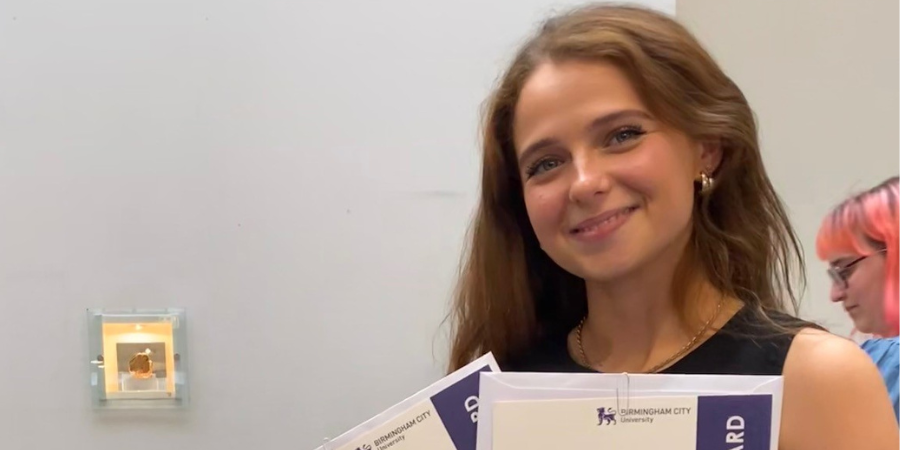
BCU jewellery graduate claims Bright New Gems 2025 accolade
Birmingham City University (BCU) graduate Ruby Lanigan has landed a prestigious Bright New Gems award thanks to her bold and architecturally inspired jewellery designs.
Facilities & Staff
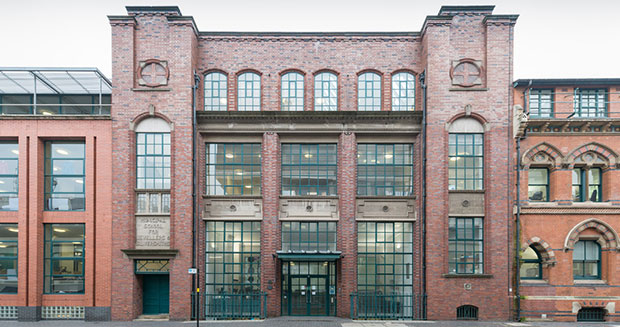
Our Facilities
The School of Jewellery at Vittoria Street is inspirational and functional. A blend of traditional historic and cutting-edge contemporary, it is light, spacious and extremely well-resourced.
An extensive refurbishment programme integrated the Victorian Gothic building of 1863 with the adjacent 1912 extension and a site further down the road. The architects’ success in doing so resulted in awards from the Royal Institute of British Architects (RIBA) and the Civic Trust.
You’ll have access to industry standard equipment, studio workshops with specialist tools and a shared machine workshop with a wide range of powered equipment, a casting facility and an electroplating laboratory. The School’s main computer suite includes CAD design software and Adobe Creative Suite, and you’ll have access to a specialist library.
